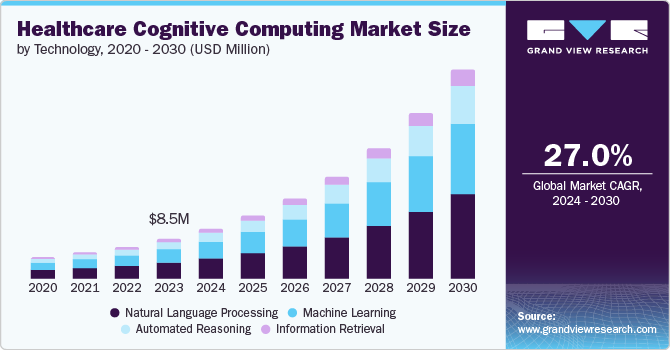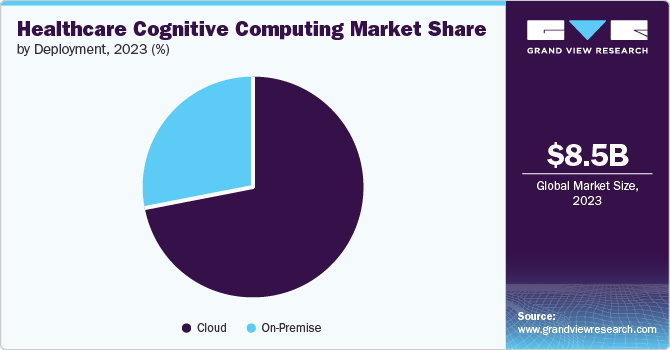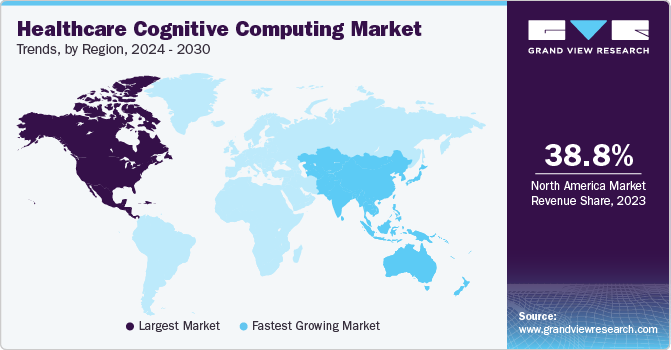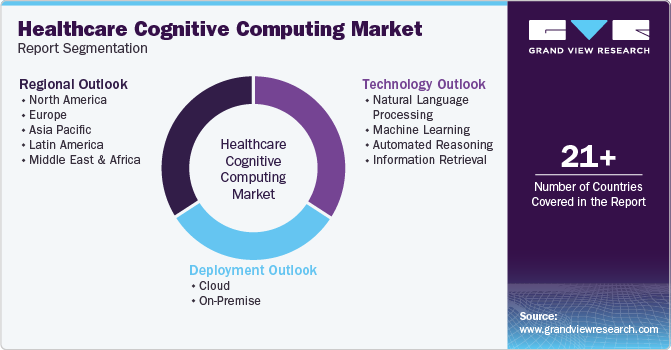- Home
- »
- Healthcare IT
- »
-
Healthcare Cognitive Computing Market Size Report, 2030GVR Report cover
![Healthcare Cognitive Computing Market Size, Share & Trends Report]()
Healthcare Cognitive Computing Market (2024 - 2030) Size, Share & Trends Analysis Report By Technology (Natural Language Processing, Machine Learning, Automated Reasoning), By Deployment, By Region, And Segment Forecasts
- Report ID: 978-1-68038-719-3
- Number of Report Pages: 100
- Format: PDF
- Historical Range: 2018 - 2022
- Forecast Period: 2024 - 2030
- Industry: Healthcare
- Report Summary
- Table of Contents
- Segmentation
- Methodology
- Download FREE Sample
-
Download Sample Report
Healthcare Cognitive Computing Market Summary
The global healthcare cognitive computing market size was valued at USD 8.48 billion in 2023 and is projected to reach USD 44.65 billion by 2030, growing at a CAGR of 27.0% from 2024 to 2030. The market growth is attributed to the increasing use of cloud services globally and a growing number of chronic diseases such as diabetes, cardiovascular diseases, and cancer.
Key Market Trends & Insights
- North America dominated the global healthcare cognitive computing market with a revenue share of 38.8% in 2023.
- The U.S. dominated the North America healthcare cognitive computing market in 2023.
- By technology, the natural language processing (NLP) segment dominated the market in 2023, with a share of 41.9%.
- By deployment, the cloud segment dominated the market in 2023, with a share of 72.0%.
Market Size & Forecast
- 2023 Market Size: USD 8.48 Billion
- 2030 Projected Market Size: USD 44.65 Billion
- CAGR (2024-2030): 27.0%
- North America: Largest market in 2023
The increased demand for big data and cognitive computing analysis in the healthcare sector, driven by rising patient data, has increased market growth.Initiatives taken by governments and top medical institutes to develop and integrate technological advancements have helped the market growth. Moreover, increased disposable income and advancements in healthcare infrastructure have resulted in market growth.
Cognitive computing technology is used in various medical areas, such as medical imaging analysis, personalized medicines, EHR data analysis, and more. Cognitive computing technology aids in the study of gene defects in patients and reduces the complexity related to it. Therefore, these factors are responsible for the growth of this market.
Furthermore, an increase in the number of chronic diseases is one of the major factors contributing to the market growth, as there is an increased demand for gene-targeted therapies to deal with cancer-causing cells while preserving healthy tissues. Third-party platforms and personalized patient care are also being utilized more to treat patients with diseases such as cancer, diabetes, and more. Moreover, increased disposable income has allowed patients to opt for personalized and technologically advanced treatment. These factors have resulted in the growth of this market.
Technology Insights
The Natural Language Processing (NLP) segment dominated the market in 2023, with a share of 41.9%. The factors attributing to the market growth are the increased applications of NLP, as natural language keywords are utilized to make searching easier during scenarios and analysis. Natural language processing is growing in the healthcare, retail, and finance sectors in applications such as virtual assistants and chatbots. Therefore, these factors are responsible for the market growth of this segment.
The machine learning segment is expected to witness a CAGR of 28.0% over the forecast period. This market segment is growing as this technology allows systems to gain knowledge from data and make predictions or suggestions automatically. Machine Learning algorithms offer personalized recommendations, fraud detection, and predictive analysis. Furthermore, the flexibility and ability to reveal hidden patterns in big datasets are also factors resulting in the market growth of this segment.
Deployment Insights
The cloud segment dominated the market in 2023, with a share of 72.0%. The market growth is due to the ability of cloud-based cognitive computing to scale, adapt, and be cost-efficient. Cloud solutions offer remote working and data sharing, which is increasingly used in the healthcare sector. Furthermore, medical institutes are willing to adopt cloud-based cognitive computing due to its versatility.

The on-premise segment is anticipated to grow at a CAGR of 25.7% over the forecast period pertaining to the increased adoption of cognitive computing by medical institutes, which requires strict data security and compliance requirements. Institutes choosing on-premises solutions have complete authority over the infrastructure and data, enabling them to personalize and optimize cognitive systems according to the requirements.
Regional Insights
North America dominated the global healthcare cognitive computing market with a revenue share of 38.8% in 2023. This growth was attributed to advanced technological infrastructure and increased investment by government and private institutes in artificial intelligence and cognitive technologies. Furthermore, increased disposable income has allowed patients and medical institutes to opt for more technological and personalized treatments with the help of cognitive computing.

U.S. Healthcare Cognitive Computing Market Trends
The U.S. dominated the North America healthcare cognitive computing market in 2023 in terms of revenue share. The factors responsible for the market growth are the increased investment by medical institutes in research and development in the AI and cognitive computing sector. Healthcare institutes are incorporating cognitive computing to reduce costs and improve patient care.
Europe Healthcare Cognitive Computing Market Trends
Europe healthcare cognitive computing market was identified as a lucrative region in this industry as it had a market share of 23.0% in 2023. This growth was resulted due to the presence of key medical institutes and increased investment in the adoption of cognitive computing. Increase in the number of chronic diseases has resulted in the demand of cognitive computing as it helps in analyzing and processing huge amount of data.
The UK healthcare cognitive computing market is expected to grow rapidly due to increased investments by government and top medical institutes present in the country. Furthermore, increase in the disposable income has allowed the patients to opt for more technologically advanced and personalized treatments, which has further propelled the growth of this market.
Asia Pacific Healthcare Cognitive Computing Market Trends
Asia Pacific healthcare cognitive computing market growth can be attributed to the growth in the healthcare sector and increased adoption of technological advancements in the healthcare sector. Furthermore, increased investment by government and private medical institutes for the adoption of cognitive computing and AI has attributed to the market growth in this region.
China healthcare cognitive computing market held a substantial market share in 2023 due to the increased adoption of cognitive computing in the healthcare sector in order to compute and analyze huge volumes of data. This aid in optimizing the medical processes and improve patient care. Furthermore, increase in the population has resulted in the increased number of chronic diseases. Hence, these reasons have contributed to the market growth in this country.
Key Healthcare Cognitive Computing Company Insights
Some of the major companies in the healthcare cognitive computing market are Microsoft, IBM Corporation, NVIDIA Corporation, Intel Corporation, and Iterx Group, among others. Companies are focusing on deploying products that can be integrated with medical procedures in order to improve accuracy of medical decisions.
-
NVIDIA Corporation is a multinational corporation and technology company that designs graphics processing units (GPUs), Application Programming Interfaces (APIs) for data science and high-performance computing. The company is also a leading supplier of AI software and hardware.
-
GE Healthcare is a medical technology company that manufactures and distributes diagnostic imaging agents and radiopharmaceuticals for imaging modalities. The company also manufactures medical diagnostic equipment such as MRI, X-ray, ultrasound, and more.
Key Healthcare Cognitive Computing Companies:
The following are the leading companies in the healthcare cognitive computing market. These companies collectively hold the largest market share and dictate industry trends.
- Microsoft
- IBM Corporation
- NVIDIA Corporation
- Intel Corporation
- Iterx Group
- GE Healthcare
- Medtronic
- Oracle
- Medidata
Recent Developments
-
In June 2024, NVIDIA Corporation announced the availability of general software NVIDIA AI Enterprise-IGX with NVIDIA Holoscan on the NVIDIA IGTX platform. Companies such as Medtronic, Barco use NVIDIA IGX with Holoscan for AI-powered solutions for medical diagnostics.
-
In December 2023, Medtronic announced the agreement of expanding its partnership with Cosmo Intelligent Medical Devices of Cosmo Pharmaceuticals. The partnership helped in transforming endoscopy with the help of AI technology. The partnership focused on using platforms such as AI Access, which was designed to host multiple third-party applications in order to streamline medical AI processes.
Healthcare Cognitive Computing Market Report Scope
Report Attribute
Details
Market size value in 2024
USD 10.63 billion
Revenue forecast in 2030
USD 44.65 billion
Growth rate
CAGR of 27.0% from 2024 to 2030
Base year for estimation
2023
Historical data
2018 - 2022
Forecast period
2024 - 2030
Quantitative units
Revenue in USD million and CAGR from 2024 to 2030
Report coverage
Revenue forecast, company ranking, competitive landscape, growth factors, and trends
Segments covered
Technology, deployment, region
Regional scope
North America, Europe, Asia Pacific, Latin America, MEA
Country scope
U.S., Canada, Mexico, UK, Germany, France, Italy, Spain, Denmark, Sweden, Norway, Japan, China, India, Australia, South Korea, Thailand, Brazil, Argentina, South Africa, Saudi Arabia, UAE, Kuwait
Key companies profiled
Microsoft, IBM Corporation, NVIDIA Corporation, Intel Corporation, Iterx Group, GE Healthcare, Medtronic, Oracle, Medidata, Google
Customization scope
Free report customization (equivalent up to 8 analysts working days) with purchase. Addition or alteration to country, regional & segment scope.
Pricing and purchase options
Avail customized purchase options to meet your exact research needs. Explore purchase options
Global Healthcare Cognitive Computing Market Report Segmentation
This report forecasts revenue growth at global, regional, and country levels and provides an analysis of the latest industry trends in each of the sub-segments from 2018 to 2030. For this study, Grand View Research has segmented the global healthcare cognitive computing market report based on technology, deployment, and region:

-
Technology Outlook (Revenue, USD Million, 2018 - 2030)
-
Natural Language Processing
-
Machine Learning
-
Automated Reasoning
-
Information Retrieval
-
-
Deployment Outlook (Revenue, USD Million, 2018 - 2030)
-
Cloud
-
On-Premise
-
-
Regional Outlook (Revenue, USD Million, 2018 - 2030)
-
North America
-
U.S.
-
Canada
-
Mexico
-
-
Europe
-
UK
-
Germany
-
France
-
Italy
-
Spain
-
Denmark
-
Sweden
-
Norway
-
-
Asia Pacific
-
Japan
-
China
-
India
-
Australia
-
South Korea
-
Thailand
-
-
Latin America
-
Brazil
-
Argentina
-
-
Middle East and Africa (MEA)
-
South Africa
-
Saudi Arabia
-
UAE
-
Kuwait
-
-
Share this report with your colleague or friend.
Need a Tailored Report?
Customize this report to your needs — add regions, segments, or data points, with 20% free customization.

ISO 9001:2015 & 27001:2022 Certified
We are GDPR and CCPA compliant! Your transaction & personal information is safe and secure. For more details, please read our privacy policy.
Trusted market insights - try a free sample
See how our reports are structured and why industry leaders rely on Grand View Research. Get a free sample or ask us to tailor this report to your needs.










